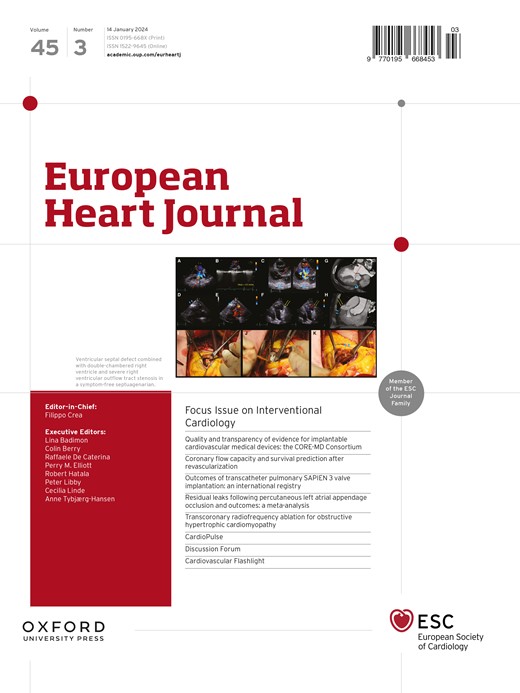Live zoster vaccination and cardiovascular outcomes: a nationwide, South Korean study.
IF 37.6
1区 医学
Q1 CARDIAC & CARDIOVASCULAR SYSTEMS
引用次数: 0
Abstract
BACKGROUND AND AIMS Despite the potential association between herpes zoster infection and cardiovascular events, limited studies have investigated the relationship between live zoster vaccination and cardiovascular outcomes. This large-scale, population-based cohort study with a long-term follow-up aimed to investigate the association between live zoster vaccination and the risk of various cardiovascular events. METHODS Data on comprehensive information of individuals aged ≥50 years from South Korea (n = 2 207 784) were included from 1 January 2012, to 31 December 2021. National insurance information from the Korea Health Insurance Review and Assessment Service, the national health examination results from the Korean National Health Insurance Service, and the live zoster vaccination data from the Korea Disease Control and Prevention Agency were merged. The risk of incident cardiovascular outcomes after live zoster vaccination was assessed compared with unvaccinated individuals. The primary outcome was the risk of cardiovascular diseases based on International Classification of Diseases, Tenth Revision code diagnosis. In propensity score-based overlap weighted cohorts, Cox proportional hazard models were used to estimate hazard ratios (HRs) for overall and specific cardiovascular outcomes, while calculating restricted mean survival time (RMST) for each outcome. The observation period was from 1 January 2012, to 31 January 2024. Multiple stratification analyses were performed. RESULTS After applying propensity score-based overlap weighting, 1 271 922 individuals were included [mean age, 61.3 years (standard deviation, 3.4); 548 986 (43.2%) male; median follow-up time, 6.0 years] in overlap-weighted cohort. Live zoster vaccination was associated with lower risks of overall cardiovascular events [HR 0.77, 95% confidence interval (CI) 0.76-0.78], particularly major adverse cardiovascular events [0.74 (0.71-0.77)], heart failure [0.74 (0.70-0.77)], cerebrovascular disorders [0.76 (0.74-0.78)], ischaemic heart disease [0.78 (0.76-0.80)], thrombotic disorders [0.78 (0.74-0.83)], and dysrhythmia [0.79 (0.77-0.81)]. The RMST difference for overall cardiovascular events following live zoster vaccination was 95.14 days per decade (95% CI 94.99-95.30). The protective association persisted up to 8 years, with the greatest reduction observed 2-3 years post-vaccination. The decrease in cardiovascular disease risk was more pronounced among males, individuals aged <60 years, those with unhealthy lifestyle habits, and those from low-income households and rural residents. CONCLUSIONS These findings suggest that live zoster vaccination may be beneficial as a public health strategy with potential implications for cardiovascular disease burden in the general population. This strategy may help address health disparities and mortality linked to cardiovascular complications.带状疱疹活疫苗接种和心血管结局:一项全国性的韩国研究。
背景和目的尽管带状疱疹感染与心血管事件之间存在潜在关联,但有限的研究调查了带状疱疹活疫苗接种与心血管结局之间的关系。这项大规模、基于人群的长期随访队列研究旨在调查带状疱疹活疫苗接种与各种心血管事件风险之间的关系。方法纳入2012年1月1日至2021年12月31日韩国年龄≥50岁个体(n = 2 207 784)的综合信息。合并了健康保险审查评价院的国民保险信息、健康保险公团的国民健康检查结果、疾病管理本部的带状疱疹活疫苗接种资料。与未接种疫苗的个体相比,评估了带状疱疹活疫苗接种后心血管事件的风险。主要结局是心血管疾病的风险,基于国际疾病分类,第十版代码诊断。在基于倾向评分的重叠加权队列中,使用Cox比例风险模型来估计总体和特定心血管结局的风险比(hr),同时计算每个结局的限制平均生存时间(RMST)。观测期为2012年1月1日至2024年1月31日。进行了多重分层分析。结果应用基于倾向得分的重叠加权后,共纳入1 271 922例个体[平均年龄61.3岁(标准差3.4);男性548986例(43.2%);在重叠加权队列中,中位随访时间为6.0年。带状疱疹活疫苗接种与总体心血管事件的风险降低相关[HR 0.77, 95%可信区间(CI) 0.76-0.78],特别是主要不良心血管事件[0.74(0.71-0.77)]、心力衰竭[0.74(0.70-0.77)]、脑血管疾病[0.76(0.74-0.78)]、缺血性心脏病[0.78(0.76-0.80)]、血栓形成性疾病[0.78(0.74-0.83)]和心律失常[0.79(0.77-0.81)]。带状疱疹活疫苗接种后总体心血管事件的RMST差异为每十年95.14天(95% CI 94.99-95.30)。这种保护性关联持续长达8年,在接种疫苗后2-3年观察到最大的减少。心血管疾病风险的下降在男性、年龄<60岁的个体、生活习惯不健康的个体、低收入家庭和农村居民中更为明显。结论这些发现提示带状疱疹活疫苗接种作为一种公共卫生策略可能是有益的,对普通人群的心血管疾病负担有潜在的影响。这一战略可能有助于解决与心血管并发症有关的健康差距和死亡率问题。
本文章由计算机程序翻译,如有差异,请以英文原文为准。
求助全文
约1分钟内获得全文
求助全文
来源期刊

European Heart Journal
医学-心血管系统
CiteScore
39.30
自引率
6.90%
发文量
3942
审稿时长
1 months
期刊介绍:
The European Heart Journal is a renowned international journal that focuses on cardiovascular medicine. It is published weekly and is the official journal of the European Society of Cardiology. This peer-reviewed journal is committed to publishing high-quality clinical and scientific material pertaining to all aspects of cardiovascular medicine. It covers a diverse range of topics including research findings, technical evaluations, and reviews. Moreover, the journal serves as a platform for the exchange of information and discussions on various aspects of cardiovascular medicine, including educational matters.
In addition to original papers on cardiovascular medicine and surgery, the European Heart Journal also presents reviews, clinical perspectives, ESC Guidelines, and editorial articles that highlight recent advancements in cardiology. Additionally, the journal actively encourages readers to share their thoughts and opinions through correspondence.
 求助内容:
求助内容: 应助结果提醒方式:
应助结果提醒方式:


